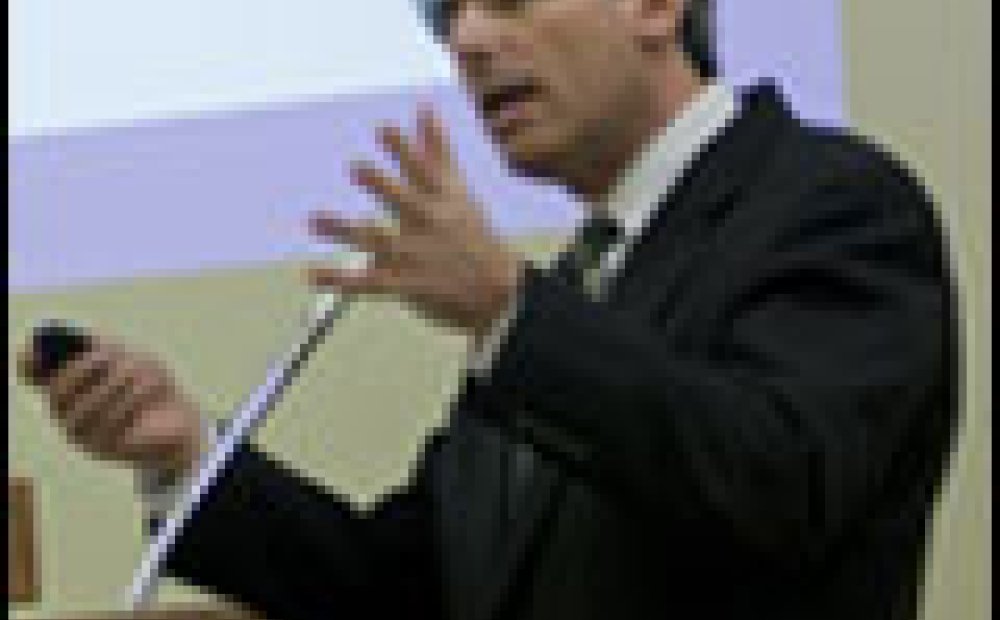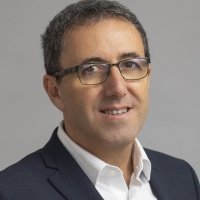Resolving Natural Resource Conflicts:A Path to Development and Peace

"[P]overty alleviation is not just a humanitarian issue, it's a security issue; and poverty alleviation then becomes an explicit security strategy," said Aaron Wolf , professor of Geoscience at Oregon State University during the Resolving Natural Resource Conflicts: A Path to Development and Peace panel hosted by the Wilson Center on the Hill , the Wilson Center's Environmental Change and Security Program (ECSP), and the Fetzer Institute on January 13.
Moderated by ECSP Director Geoff Dabelko, Gidon Bromberg , co-director of Friends of the Earth Middle East (FoEME) and Juan Dumas , senior advisor of Fundación Futuro Latinamericano (FFLA) joined Wolf to discuss how a focus on natural resources, especially water, can bring broader peace to areas of conflict.
Water and Security
"[W]hen I first got involved, this was the going ethic: water wars are on the horizon, [and] competition for fresh water may well be the source of conflict for wars in the future," said Wolf in a discussion on how water resources are inherently tied to security issues in many regional conflicts.
His research, however, suggests the opposite . In recent history, he said, cooperation for the resource — not conflict — was observed in nearly two-thirds of the world's 265 cross-boundary watersheds and "...80% of documented conflict between two countries was [limited to] verbal conflict."
In addition to the choice of trans-boundary water cooperation over conflict, Wolf also emphasized that many of the treaties crafted by water neighbors "are very resilient over time." He reminded the audience that the Indus treaty signed by India and Pakistan in 1962 has survived two wars between the countries.
Instead of "water wars," Wolf believes policy makers should be more concerned about security issues that will arise as large population migrations occur when regions begin to run out of water. "There is a dynamic that's [taking] place where people move—generally angry men—... to cities that do not have the infrastructure to absorb them, and if that happens across boundaries you end up in areas of regional destabilization," Wolf said.
"This is the perfect type of problem to think of diplomacy, defense and development all in the same sentence," Wolf summarized during the question and answer portion of the panel. "The link between poverty and security is one that needs to be made over and over and over again so that our foreign assistance is focused and...much more extensive than it is now."
Water as an Entry Point to Cooperation"Water can be the real impetus to move cooperation. When people are not talking on other issues they can talk about water," said Bromberg as he introduced the Good Water Neighbors (GWN) project—a FoEME program seeking to improve water scarcity and quality in the Jordan River watershed by fostering cooperation between Israeli, Palestinian, and Jordanian leaders.
"Why are people willing to work on water?" he asked. "Because water is shared, and nowhere is water more shared than in the Middle East between Israelis, Palestinians, and Jordanians, because all of our critical water resources cross one or more political boundary."
Through multiple outreach programs, Bromberg said, GWN brings together young people, mayors, religious leaders, even environmental ministries from the three communities to learn about the poor quality and availability of their shared water resources as well as how to work together to improve their own water realities.
"The fact that the Jordan no longer has fresh water flowing through it, the fact that it is a sewage canal today, is [the community's] loss," he emphasized, "And the mayors are seeking to improve the economic possibilities, the water reality, that their residents can benefit from...This is not about becoming best friends. This is all about problem solving."
While hesitant to say the program could lead to or be a model for peace in the Middle East, Bromberg said GWN underscores how water, as a common interest, can bring together parties who are normally at odds. "Despite the politics, the understanding is that this is a win-win, that we can make advances on water issues when maybe on other issues we can't advance so quickly," he said.
Lessons in Conflict Avoidance and ResolutionDrawing from his experiences trying to resolve conflicts between resource developers and indigenous peoples in South America, Dumas emphasized that disputes on the local level are often the local manifestations of larger problem. For example, when 33 dams were proposed to be built in the Patagonia region, he said, FFLA chose to bring the issue to the national public policy level. "In a nutshell it ended up being quite a successful process where we had three presidential candidates discussing the scenarios in terms of what they plan to do for energy in the country and for Patagonia," he said.
But, Dumas acknowledged, resolving local-level conflicts is still important.
Funding streams, he said, are the biggest limiting factor for organizations that seek to facilitate dialogue in environmental conflict areas. The ability to travel on short notice to help resolve conflict has been extremely beneficial to Dumas' organization; but in an arena where funders require full proposals and lengthy application procedures, such availability over the long-term is not financially sustainable. "The proposal has to have all these outcomes, indicators, [but] it doesn't work like that," Dumas said. "Conflict doesn't wait for money, violence doesn't wait for money. You just have to be there."
Therefore, in order to address local-level conflict adequately, Dumas says organizations like FFLA require two things from its funding agencies. "One is longer term commitments. We cannot deal with public policy issues like these in two year frameworks, it doesn't work," he said, "and the other one is that we need lots of flexibility."
Both issues were addressed in the creation of FFLA's Early Action Fund , a strategy that Dumas recommends be scaled up in the conflict resolution community. "The hypothesis for that fund is that with a very small amount of money, the right capacities at the right time, you can prevent violence over natural resources," he said, "...we've proved that. So I think that its now time to try to scale this up."
Drafted by Julia Griffin.
Speakers

Hosted By

Urban Sustainability Laboratory
Since 1991, the Urban Sustainability Laboratory has advanced solutions to urban challenges—such as poverty, exclusion, insecurity, and environmental degradation—by promoting evidence-based research to support sustainable, equitable and peaceful cities. Read more


Environmental Change and Security Program
The Environmental Change and Security Program (ECSP) explores the connections between environmental change, health, and population dynamics and their links to conflict, human insecurity, and foreign policy. Read more
